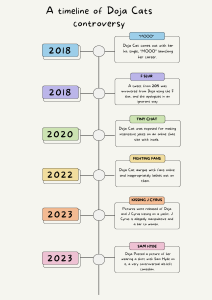Netflix’s Big Mouth makes a fantastic and relevant return with its fourth season

January 8, 2021
Big Mouth, the deeply profane Netflix show, made its return with its fourth season on December 4th. This season tackles important issues including–but not limited to–racial oppression and identity, anxiety, and being a transgender tween in the only way it can: with obscene, absurd, and raunchy humor.
Anyone who has seen Big Mouth knows that the show does not pull any punches. We all remember the very first episode, which for obvious reasons I can’t quote or summarize in a school newspaper (it’s dangerous to even reference it). Nevertheless, where three previous seasons never held back, the fourth season may be the most risque, or to put it more bluntly, the grossest season yet. The episodes that exemplify this are the ones where Nick, Jessi, and Andrew are at summer camp. There is a whole episode dedicated to Jessi having the “biggest period ever,” several episodes dedicated to Andrew’s poop issues, and numerous jokes about male genitalia. These episodes are still funny; there’s an almost perfect balance of potty humor and emotional thematicism, which is something many Big Mouth fans expect from the show.
This season also may be one of the funniest yet; I laughed out loud several times while watching, despite judgemental looks from my parents. Nick Kroll and fellow creators on the show write hilarious dialogue, and the Hormone Monsters (Maury, Connie, and Mona) are as funny as they’ve ever been. I am unable to give any examples of jokes or lines that made me laugh because, again, this is an article on a school newspaper. But I can assure you that this season will make everyone cackle.
Big Mouth is truly a comedy at heart, but it still handles several serious themes. Missy, one of the main characters, goes through several episodes trying to find her racial identity. In one episode, DeVon, another black character, teaches Missy about code-switching, presenting it as a superpower. For example, when he’s around white women, he “switches” to an upper class kid who dresses more like a southern white boy going to a Sunday Church service than a normal New York 13-year-old. Later in the episode, code-switching is revealed to be a tool of oppression and white privilege, not a superpower, which shows how the series presents controversial topics in a way that teens will listen.
At the beginning of the show, when several characters are attending the previously mentioned summer camp, we meet Natalie, a transgender student. Natalie goes through a lot, especially when she makes out with fellow camper Seth and he doesn’t want other people to know they made-out because she’s trans. Despite many difficult feelings about not belonging, Natalie is able to find comfort in her friendship with Jessi. Natalie and Jessi stick together and share their feelings with each other when they’re together, creating a strong friendship.
Jessi also goes through a lot in Season 4. She finds a boyfriend named Michael Angelo, but he ends up being a manipulative creep. Battling not only a pervy, coercive boyfriend that she is reluctant to leave (she often relies on him to determine her self worth), Jessi also faces depression and anxiety as she fails to meet her mother’s high expectations. But the show doesn’t depict her as helpless; oftentimes, female characters with mental health issues are portrayed as erratic and completely helpless. After Jessi starts going to therapy, she meets the Graditoad, who is able to help her face her depression and anxiety and handle it in healthy ways.
All of the struggles listed above are examples of some of the hard times the beloved characters of Big Mouth face, but there are so many more stories in this coming-of-age show. That’s where the beauty of Big Mouth, especially this most recent season, can be found. There’s a level of emphaticness in the overarching themes of anxiety, depression, and finding your identity that makes the show relatable and puts Big Mouth Season Four in the spotlight.
The show destigmatizes hard-to-talk-about themes by putting them in silly characters (Tito the Anxiety Mosquito, Depression Kitty, etc.), where they become much easier to handle for characters and viewers alike. When Season Four came out, I was battling with my own anxiety, and the episodes that dealt with anxiety offered tips to handle it that I used in real life. Anxiety, depression, really any mental illness is hard to deal with at our age. The writers of Big Mouth completely understand this, and while the characters of Big Mouth are a few years younger than most of the people who will be reading this article, the themes about mental illness–and how to handle it–are universal.








